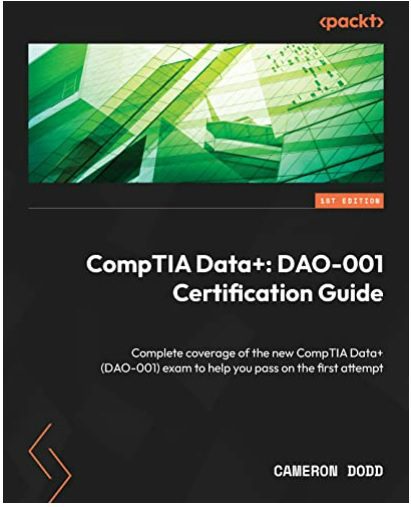Cameron Dodd is the author of CompTIA Data+: DAO-001 Certification Guide; we got the chance to sit down with him and learn more about his writing experience with Packt.
Q: What is/are your specialist tech area(s)?
Cameron: Data Science Curriculum Writing and Instruction.
Q: How did you become an author for Packt? Tell us about your journey. What was your motivation for writing this book?
Cameron: I was the subject matter expert CompTIA hired to teach other instructors how to teach students about the exam (train-the-trainer). As the go-to person for passing the exam, I was constantly asked for advice and study resources, but I had no good answers. There wasn’t one easy resource that had everything I knew the students needed to pass. When Packt approached me about writing a book, I jumped at the opportunity. I was happy to bring together all of the concepts, tips, and tricks to pass this exam into one book. I truly enjoy helping students and sharing my knowledge in terms that are easy to understand.
Q: What kind of research did you do, and how long did you spend researching before beginning the book?
C: The concepts covered in this book are mostly ones that I have learned the hard way: working, writing, and teaching in the data field for the last decade. I spent months gathering all of them in one place to teach the official course for CompTIA, so I had my notes prepared for the book right away. The biggest issue with the research was that experts in the field often don’t agree on terms or what is the best way to do things. I had to try to get an unbiased approach that would let the reader know the popular opinions without distracting them too much from what they actually needed to know for the exam.
Q: Did you face any challenges during the writing process? How did you overcome them?
C: My biggest challenge was probably the life-threatening infection I acquired while working on this project. I bet you didn’t know writing could be so dangerous! Joking aside, not finishing the book was never an option. I am passionate about sharing this material because I honestly believe that getting this certification will help people progress in their careers. In other words, it can change lives.
Q: What’s your take on the technologies discussed in the book? Where do you see these technologies heading in the future?
C: Data is a growing field, and everything points to it continuing to become more and more important. Certifications like this one will only become more important. We have seen this in similar tech fields, like cybersecurity, where employers start looking for certifications instead of degrees because they help standardize an otherwise diverse field. Employers may not know what skills a college does or does not cover, but they know exactly what to expect from someone with an up-to-date technical certification.
Q: Why should readers choose this book over others already on the market? How would you differentiate your book from its competition?
C: Honestly? Me. This book was written by someone who not only knows this information but was trusted by CompTIA to teach their instructors and specializes in writing content that makes technical or complicated concepts simple and approachable. Most importantly, I take my work very seriously, with real-world examples such as: how many nuts you need to feed your squirrel before it gets fat, the statistics of everyone’s favourite sports team (The Fighting Goldfish), and how to use hypothesis testing to see if your muffins are objectively better than that braggart Jim’s.
Q: What key takeaways do you want readers to come away with from the book?
C: I want them to pass the exam and earn their certifications on their first attempt. The focus of the entire book is solely to enable them to do that.
Q. What advice would you give to readers learning tech? Do you have any top tips?
C: Understand what you are doing and why you are doing it. A lot of books and programs will teach you to copy and paste code very well, but if you don’t understand the basic concepts, you won’t know when or how to apply that snippet of code. It is easy to get so wrapped up in the details, especially when you are learning tech, that you forget the bigger picture. Try to keep everything in context. This is especially important with Data + because it is so theoretical.
Q. Can you share any blogs, websites, and forums to help readers gain a holistic view of the tech they are learning?
C: Sure! https://towardsdatascience.com/ is a great resource. Not only do they have free tutorials on several different skills, but you can sign up for their newsletter: The Variable. It gives articles from experts all over the field on all kinds of relevant topics. I highly recommend signing up for it, whether you are a data professional or aspiring to be one.
Q. How would you describe your author journey with Packt? Would you recommend Packt to aspiring authors?
C: I have produced educational products for half a dozen major companies around the world, but Packt was probably my favourite. From project managers and editors to marketing, everyone has been great.
Q. What are your favourite tech journals? How do you keep yourself up to date on tech?
C: The Seattle Data Guy does a great job with the big-picture concepts of where the data field is going. He even has a Discord community you can join!
Q. How did you organize, plan, and prioritize your work and write the book?
C: First, I looked at the list of objectives posted by CompTIA for the exam, which, more or less, follows the project life cycle but does not necessarily group basic concepts together in an intuitive way. Next, I created an outline that still hit all of the objectives but did it in a way that was much easier for the students to follow. After that, I just sat down and wrote a chapter a week. Each week, I did research to make sure all of the concepts were up-to-date first. Then I planned out the specific sections to make the concepts easy to understand, outlining each chapter. Next, I wrote, leaving placeholders for visuals. Then I reviewed it to make sure everything the students needed to know for the exam was there and that it made sense. Finally, I went back and added visuals, code, datasets, and Packt-specific formatting as required before sending it to my editor.
Q. What is that one writing tip that you found most crucial and would like to share with aspiring authors?
C: If you want to write professionally, you have to write like a professional. Set hours, be organized, treat it like the job you want it to be, and write even when you don’t feel like it. You can always go back and rewrite it later if it is terrible, but no editor can fix a blank page.
Q. Would you like to share your social handles? If so, please share.
C: https://www.linkedin.com/in/cameron-dodd
You can find Cameron’s book on Amazon by following this link: Please click here









